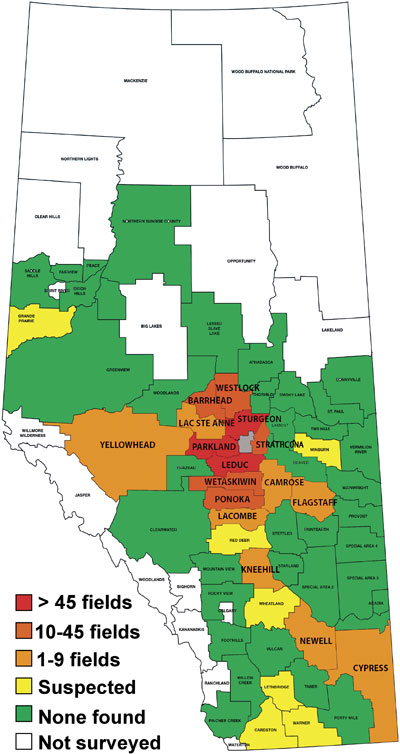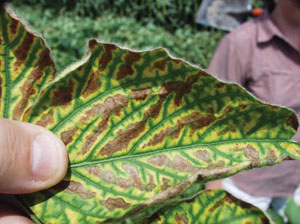
Features
Agronomy
Other Crops
The increasing importance of the internet
There is no doubt that the internet has come to play a much more important role on the average farming operation. Many producers are reaping the benefits of the new technology.
December 22, 2008 By Top Crop Manager
More growers gathering information for themselves.
There is no doubt that the internet has come to play a much more important role on the average farming operation. Many producers are reaping the benefits of the new technology. As more information becomes available only online, there is an increasing push for
 |
|
| Mike Cowbrough, weed specialist with OMAFRA, believes the internet offers more sophisticated technology that allows growers to help themselves. |
growers to become internet savvy.However, this is not a one-sided movement. Many organizations are creating online resources in response to the demand from growers. One such organization, the Ontario Cereal Crops Committee (OCCC) has moved all of its information online. “We realized that more and more people were using the internet for weather information and all sorts of data acquisition and it was becoming a lot more logical place for people to go for that information,” says Dr. Duane Falk, the Performance Testing Coordinator for the OCCC and an associate professor at the University of Guelph.
Currently, www.gocereals.ca is the official voice of the OCCC. Traditionally, the committee distributed variety testing results to farmers across Ontario by publishing paper copies of the results. Recently, the OCCC made a complete transition from paper copies to the internet.
In addition to the realization that more people were online, problems with the traditional methods of distributing the OCCC’s information made the internet a viable option. “As the costs of producing the hardcopy went up and as the personnel and time available went down, it just became more and more of a nightmare,” continues Falk, referring to the old way of distributing the information. Many producers find this new online format beneficial as the internet becomes a more integral part of farm operation.
Mike Strang, a cash crop producer near Exeter, Ontario, says the internet is his main source of information for the farm. “I rarely ever call a crop consultant or anybody like that. If I have a disease or pest problem in the field, I go to the internet first. Ninety-five percent of the time, you can identify it on your own,” explains Strang.
New research sites like www.ontarioweeds.com and www.weedpro75.com appeal to producers who, like Strang, enjoy solving their own problems. The first site, www.ontarioweeds.com, is an online database designed for optimal search ability. “It uses the web to take out the difficulty of a traditional weed key. Essentially, it’s just a better way to identify species without having to know a lot about them,” says Mike Cowbrough, project lead for websites and weed specialist with the Ontario Ministry of Agriculture, Food and Rural Affairs.
The site is also designed to “talk to” www.weedpro75.com, which is a herbicide selector that takes into account the price of the current crop, the price of the herbicide and the weeds present in the field.
New sites like these have advantages and disadvantages. Cost is an important advantage for those trying to disseminate information. The internet is a relatively cheap and effective way to make a lot of information available to a lot of people.
 |
|
| An increasing number of growers are making better use of agronomic information from a variety of sources, all to improve on-farm production. |
Both information providers, people like Falk and Cowbrough, and information consumers, producers like Strang, benefit from the immediacy of the information. As Cowbrough says, “a print publication is only as good as the day it is published.” But with the internet, websites can be updated as soon as new information is available and people can access that information at any time.
But the internet also poses some risks for those seeking information for their operations. Falk warns that not everything on the internet is reputable. “If it is on the internet, you are never really sure that it is absolutely the best information available. I think people are catching on to the idea that you check out three or four different sites and then make your own decisions whether you should have faith in that information or not,” he continues.
Strang uses this strategy when looking for information online. He also tries to limit his searches to university and government websites, to ensure the information is reliable.
Some may fear that with the internet’s growing uses, local retailers, crop advisors and print publications will lose out. However, Strang believes those sources of information will always have their place. “I don’t exclude local retailers completely. A good example, a couple years ago a local retailer made a suggestion about a herbicide program I never thought of and it turned out to be a wonderful idea. So I still benefit from local retailers,” explains Strang.
Strang also does not foresee the internet taking over print publications. “The magazines are something I’ll read to seed ideas. And if I really want to dig into something, I’ll go to the internet to find more information,” he says.
Although the internet is a growing source of information in agriculture, access to the technology may impede its growth. Many producers in rural Ontario still do not have access to affordable high speed internet. “Slow adoption is not a function of humanity, it is a function of technology,” says Cowbrough. “A lot of these resources are unbearable on dial up. That is why it probably won’t grow as fast as the tools are coming out. Unless everyone has high speed internet, it’s a challenge,” he continues.
In addition to easier access in rural areas, Strang envisions technology improving in the future to make access in the field possible. “Right now, I can get that information off my desktop in the house. But if I want to get a weather map I have to get out of the tractor and go into the house. I know there are laptops and blackberries, but that’s expensive and clumsy. That needs to evolve more,” details Strang.